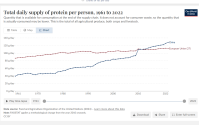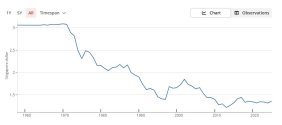I'm not seeing the logical step that links the cause and effect of the bolded sentence. This is essentially what India does, however India is nowhere close to China in quality of life. This is also what the US did in the past, leading to deindustrialization and today's woes.
The second question is what goods and services exist outside of China that are good enough to compete with local Chinese goods and services, and what benefits importing (rather than producing their own) would bring, in the long term. Long term consideration is needed because sustainability.
Very few examples spring to mind - Tesla (again made in China, not imported), which helped level up local EV companies in their infancy by bringing in a then-world class competitor, ICE auto JV's (again MIC, not imported) which helped level up supply chains and worker skills, Foxconn (MIC) for electronics, which all have a use by date when the "leveling has upped". Again the benefits from these were all in the form of making in China and transferring the necessary skill and tech foundation, rather than importing something that most people then could not afford (and now won't buy because they are no longer competitive).
The USD/CNY exchange rate issue is a mickey mouse issue to me; it only affects imports and overseas spending. Yes, there is an increase in QOL when travelling etc., but that doesn't drive further internal growth and thus isn't a sustainable increase (you are spending your money in someone else's country).
Re: European standard of living - they achieved this through industrialization, which allowed them to manufacture more at less cost and export the surplus. Colonization (read: stealing of resources and slave labor) also helped a lot in expanding the scope of their QOL.
I'm not sure if your background is economics (in which case you may need to de-kool aid yourself from certain theories), but the notion that importing brings prosperity is both erroneous and also doesn't work if you produce the majority of and the best goods.
Mods - feel free to move this discussion to the Chinese Economics thread if it is more appropriate there.
There is no need to take it to the other extreme. The case of the United States is quite unique, because it holds the reserve currency and the international exchange currency, and it can have a trade deficit as large as US$1 trillion because capital flows to the United States at the same rate. For example, if I am the owner of an automobile factory in the United States and I sell a car to a Canadian, this sale is counted as an export. On the other hand, if a Canadian buys shares in my company, this is counted as "foreign investment" and will not be included in the trade surplus/deficit calculations that concern economists so much. But note that, in both cases, something was sold. In the first situation, I sold a car. In the second situation, I sold a share. The first sale was counted as an "export". The second sale was counted as "foreign investment". And with one detail: the dollars used in this foreign investment will end up being used for imports. Therefore, the counterpart of a foreign direct investment is the import of a good or service.You basically advocating China to repeat the same mistake as the US made.
However, given that foreign investment is not counted as exports/imports, is it really surprising that countries have trade deficits? Well, it is precisely these foreign investments that allow imports. A country that is importing little is a country that is not very attractive to foreign investors. It will certainly be a poor country. Therefore, it is worth repeating: all trade transactions must balance out. If a country has the capacity to import goods and services produced by the rest of the world, this means that the rest of the world has shown an interest in investing in that country.
In fact, here is a list of some countries that, in recent decades, have always or almost always had deficits in their trade balance: Australia, New Zealand, Switzerland (incidentally, the latter had the longest deficit of all, from 1950 until the mid-1990s), the United Kingdom and Luxembourg. Chile, on the other hand, during its decade of development, had recurring deficits in its trade balance. On the other hand, choose any country in South America or Africa and the chances are that you will find a country that exports much more than it imports.
Rich populations are those with broad access to goods and services produced by the rest of the world. They are those who have the means to import. That is why we wake up early and work hard: to obtain the means to raise our standard of living. And importing quality foreign goods and services raises our standard of living.
China would not have the same effects as the Americans, because of its comparative advantages in relation to the rest of the world. Go back to my previous comment about the main factors for productivity, China strictly complies with almost all the items, the revelation here is that China exports so much that it should import as much, if not more, but this effectively does not happen and has nothing to do with accessing worse products in the external market.
The advantage of exporting a lot is being able to use this foreign currency to import a lot. However, if the government imposes import tariffs, blocks trade and devalues the currency, then exporting a lot not only does not bring any benefit, but it actually worsens people's well-being. Exporting a lot means that the supply of products in the internal market is decreasing (which generates an increase in prices). And restricting imports means that there is no replacement of these products in the domestic market. In other words, those who argue that exports should be increased and imports should be restricted are actually saying that the quantity of products available to the national population should be doubly reduced — generating, at the very least, more high prices.
Furthermore, I think you really have no idea how the currency and the purchasing power of that currency can influence the decision to import. Devalued currencies end up restricting imports, because they need to use a greater amount of their currency to buy a certain amount of goods and services from another country. It turns out that they would buy even more imported goods and services if the currency were valued. A greater supply of goods and services increases the population's standard of living. The more they consume, the greater the import, the greater access to goods and services from the world... Furthermore, it is not only consumer goods that should be considered from the perspective of imports. Importing capital goods to increase general productivity further boosts the economy and economic growth. Just see the previous comment about productivity.
Regarding the concern about deindustrialization, it is really a scenario that deserves attention, but if you state with all certainty that China is really very competitive globally as it says it is, it becomes even more of a reason for China to fully liberalize its trade and imports, in addition to allowing an appreciation of its currency. Regardless, I believe that this scenario of deindustrialization deserves attention, but much of it is due to erroneous comparisons with the USA, which is a particularly unique case.


